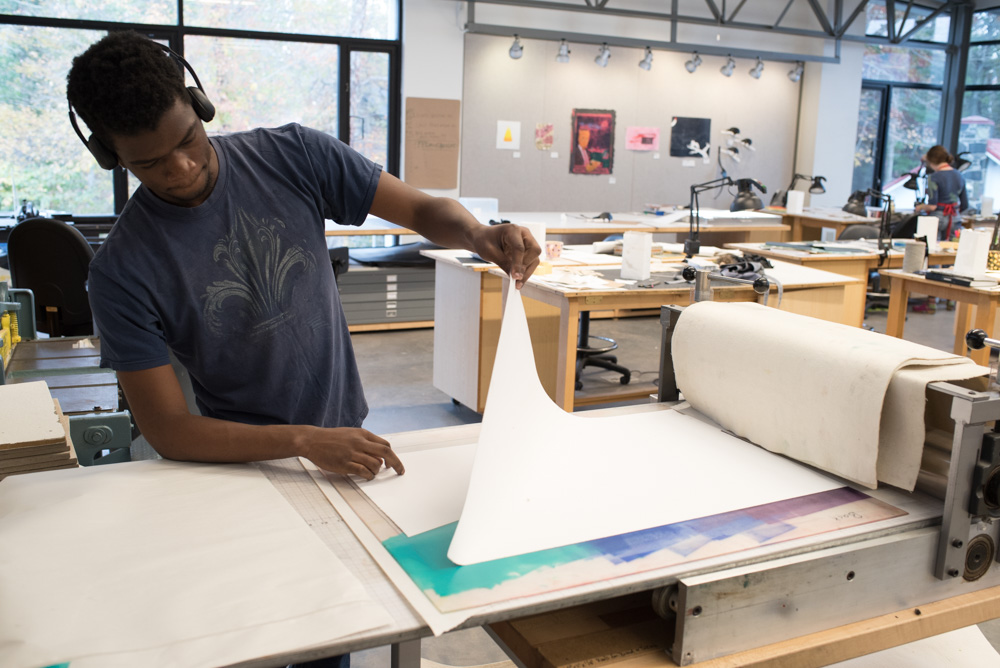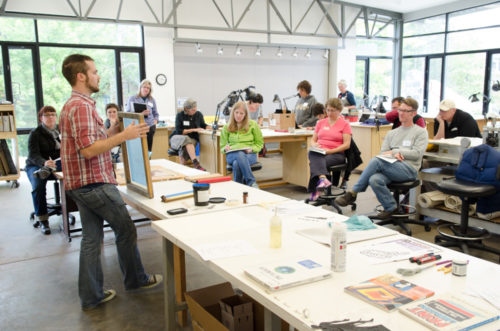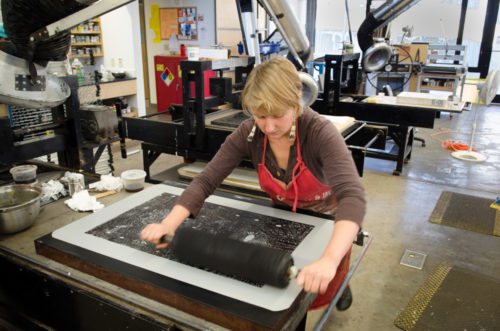Penland Printmaking Program

The Penland printmaking program offers beginning to advanced workshops in traditional and contemporary methods. The printmaking studio provides the space and specialty equipment to explore image-making through the lens of materials and craft, via work in primarily two-dimensional formats. The technical and conceptual scope of each workshop is determined by the instructor with input from our program director and support from our programming staff. Our versatile facility and high caliber artist/educators allow us to provide relevant programming in topics from aquatint to experimental mark making and mixed matrices and everything in between. We strive for a balance of technical and aesthetic content and value all cultural and historical perspectives. We offer workshops that inspire and challenge students from curious beginners to accomplished professionals. Our programming is current in spirit and respectful of craft traditions.
The printmaking studio is very flexible, but is particularly well equipped for printmaking processes such as lithography, intaglio, relief, monotype, and screen printing. The range of workshop topics includes but is not limited to stone lithography, Japanese woodblock, screenprinting with hand drawn imagery, plate lithography, collograph, photogravure, mezzotint, multi plate color etching, figure drawing and printmaking, photo etching, words and image. Traditional printmaking processes as well as other approaches such as collage, digital imagery, mixed media, and installation may be used observationally with subjects such as figure, still life, and landscape or in the exploration of abstraction, ideation, and the expressive qualities of materials. Topics also include design and composition, color theory, and idea generation. Recent instructors include Koichi Yamamoto, Curtis Buchanan, Lisa Bulawsky, Jay Ryan, Keiji Shinohara, Thomas Lucas, Clay Harmon, Althea Murphy-Price, Andrew and Kathryn Polk, Stuart Kestenbaum and Susan Webster, Kristen Martincic, and Karen Kunc, among many others.
Our workshops take place in a well-equipped, well-maintained, and safe studio designed to accommodate diverse content and working styles. There are work tables for each student, pin up space, an etching room, a darkroom with exposure unit, and a screenprinting wash out booth.


Equipment
The Paul Hayden Duensing printmaking studio is equipped with the following:
- American French Tool etching press (40″ x 70″)
- Charles Brand etching press (36” x 60”)
- Takach etching press (30” x 60”)
- Charles Brand etching press (22” x 44”)
- (2) Charles Brand litho presses (30” x 50”)
- Charles Brand litho press (24” x 40”)
- Takach table top litho press (24” x 48”)
- Litho graining sink (24″ x 48″)
- (2) hot plates (40″ x 30″ and 18″ x 24″)
- Aquatint box
- Baselayr V3648 LED Exposure Unit (36″ x 48″)
- Lawson screen dryer
- AWT vacuum printing table
- (12) screen printing clamp boards
- Washout booth (backlit)
- PEXTO plate cutter
- Takach rollers and hand brayers
- Inking slabs (36 x 60″)
- (50) Litho Stones range in sizes from 6” x 8” up to 20” x 24”
- (2) 30” x 48” wire drying racks
- 20” x 30” wire drying rack
- 30″ x 48″ paper soaking sink
- Flat files (50″ x 38″)
- (2) 72″ x 30″ individual work tables with cabinets
- Ventilated acid room with hood ventilation for etching, spray booth, and adhesives
- (3) vertical tanks for ferric chloride
- (3) iMacs with Adobe CC
- (2) Epson Stylus Pro 3880s
This list of equipment is intended to give you an idea of what the studio is like. It is a general description of equipment and may change before your session. The equipment used by your class will be determined by your instructor and will be appropriate to the techniques covered in your class. Students are welcome to bring favorite personal hand tools for use in the studio.
Supplies and Materials
Shared supplies such as inks and solvents are available in the studio and are normally included in your summer tuition. An additional studio fee will be assessed in classes that use a large volume of these supplies or require special materials. You will be notified in advance if a studio fee greater than $50 is expected. During concentration, shared supplies are not included in tuition, therefore each class will be assessed a studio fee based on all shared materials usage. You are responsible for bringing other supplies needed for individual work. Printing matrixes such as zinc, copper, wood, linoleum, and plexi plates will be sold through the studio or store as per instructor request. Please refer to your instructor’s material list for specific materials needed for your class. Rags will be supplied for solvent use and must be disposed of in one of the studio’s marked flame-resistant cans. In order to reduce waste, paper towels are NOT provided, so please plan to bring 3-4 cotton towels for your personal non-solvent use. If you feel the need to use paper towels, please bring enough rolls for the duration of your session.
The school maintains a comprehensive hazardous waste program and asks that you limit the materials you bring to campus to those classified as non-toxic. The material must be in its original packaging. An environmental fee will be assessed for classes generating hazardous waste. In order to limit the hazardous waste generated in the studios, we cannot allow students to bring toxic materials outside of the class supply list into studios.
Toolkits
Toolkits are NOT provided in printmaking. Please refer to your instructor’s material list for specifics about personal tools needed for the class.
Classroom
Printmaking classes are held in the new Paul Hayden Duensing studio building. The main classroom is equipped with intaglio and litho presses, a hot plate, a rosin box, a plate cutter, inking slabs, paper soaking sink, a flammables cabinet, a graining sink, and several worktables. There is a separate ventilated acid room with hood ventilation, vertical etching trays, and a spray booth. The building also houses a screen washout room and small darkroom for coating, exposing and drying screens. The maximum class size is 12 students.
Student Workspace
Students work at individual worktables that are 30” x 60” with lockable cabinets. Each workspace is equipped with clamp-on lamps and padded chairs.
Safety Information
A first-aid kit, fire extinguisher, eyewash station, and safety shower are located in the print and letterpress studios. There is a mandatory safety walk through at the beginning of every class. The walk through is to introduce you to the studio space and to show you the safety equipment. North Carolina Health regulations do not permit Penland to provide safety equipment for shared use. Therefore, items such as dust masks, respirators, gloves, and aprons are sold in the supply store. You may prefer to bring your own from home. Please refer to your instructor’s material list for specifics about safety equipment needed for the class. Flameproof cans are provided to collect hazardous waste, such as rags used with mineral spirits or other solvents. In addition, there is an estimated $10 hazardous waste removal fee per student to cover the costs of safely disposing of ink and solvent waste. Alcohol is not permitted in the studios. Working in the studios under the influence of alcohol is not permitted. The use of illegal drugs at Penland is prohibited.
Shared Studio Equipment
Shared space/music: Each class should discuss the playing of music and reach a consensus on the time of day, the volume, and the type of music to be played. Tolerance and consideration are expected from everyone.
If you wish to use equipment in other studios on campus during your session, you must work with the instructor, studio assistant, and coordinator of that studio to arrange access. They will determine if the desired usage is compatible with their class’s activities and if you are able to work safely and independently with the equipment.
Session Schedules
Each session starts with an all-school meeting Sunday evening at 5pm followed by dinner in the Pines. Classes start Sunday at 8:30pm. Classes end and studio clean-up takes place the day before your session ends. The last day of each session is reserved for farewells and an all-school exhibition of work created during your time at Penland.
Everyone must participate in studio clean-up; if you must leave early, please ask the studio assistant to assign you clean-up tasks you can accomplish before your departure.
If you have questions, contact:
Studio Coordinator: Adam Leestma
828-765-2359 x 1328
print@penland.org


